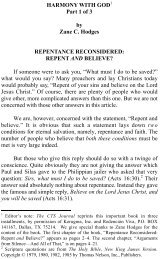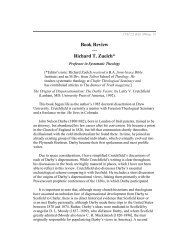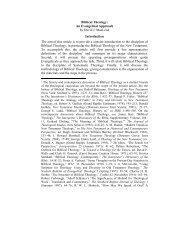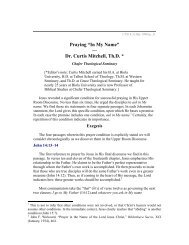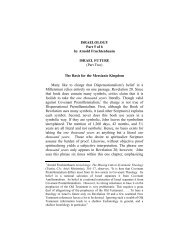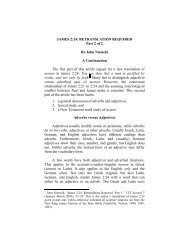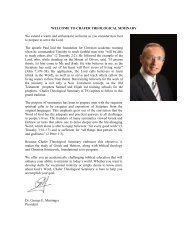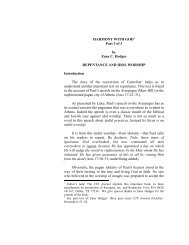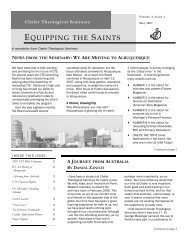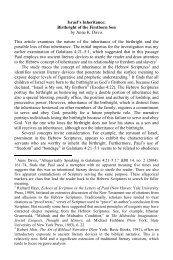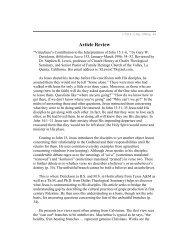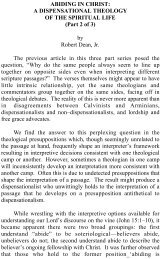Is Belief in Eternal Security Necessary for Justification? - Chafer ...
Is Belief in Eternal Security Necessary for Justification? - Chafer ...
Is Belief in Eternal Security Necessary for Justification? - Chafer ...
You also want an ePaper? Increase the reach of your titles
YUMPU automatically turns print PDFs into web optimized ePapers that Google loves.
58 CTS Journal 13 (Spr<strong>in</strong>g 2008)<br />
referenced <strong>in</strong> Hebrews 11 were promises that could justify if believed. We are<br />
just establish<strong>in</strong>g that assurance is of the essence of faith and that this assurance<br />
pr<strong>in</strong>ciple applies to any and every promise of God listed <strong>in</strong> the Bible. If the faith<br />
is <strong>in</strong> a promise deal<strong>in</strong>g with <strong>for</strong>giveness of s<strong>in</strong>s, we are assured that our s<strong>in</strong>s are<br />
<strong>for</strong>given if we believe the promise. Thoughts of eternal life or eternal security<br />
may not even be on the radar screen when one trusts <strong>in</strong> Christ <strong>for</strong> <strong>for</strong>giveness of<br />
s<strong>in</strong>s. But if the promise is one deal<strong>in</strong>g with life with God <strong>for</strong>ever (John 11:25)<br />
and assurance is of the essence of faith, then faith <strong>in</strong> that promise <strong>in</strong>cludes the<br />
assurance that one will live with God <strong>for</strong>ever.<br />
But say<strong>in</strong>g that assurance is of the essence of faith is not the same as say<strong>in</strong>g<br />
that sav<strong>in</strong>g faith <strong>in</strong>cludes belief <strong>in</strong> eternal security. If the promise is <strong>for</strong>giveness<br />
of s<strong>in</strong>s, then to believe it means to have the assurance that one’s s<strong>in</strong>s are<br />
<strong>for</strong>given. It says noth<strong>in</strong>g about future s<strong>in</strong>s, the key issue when speak<strong>in</strong>g of eternal<br />
security. To be sure, when Mary believed Jesus’ words to her concern<strong>in</strong>g His<br />
be<strong>in</strong>g the resurrection and the life, she had assurance that she would be raised<br />
and live with Him <strong>for</strong>ever. The assurance is l<strong>in</strong>ked to the promise given. To say<br />
that one must believe <strong>in</strong> eternal security to be justified br<strong>in</strong>gs us back to the<br />
questions of whether the only clear statement regard<strong>in</strong>g what is required <strong>for</strong><br />
justification comes <strong>in</strong> the Gospel of John and whether the life John references is<br />
always an <strong>in</strong>dication of l<strong>in</strong>ear time. The issue is not whether assurance is of the<br />
essence of faith <strong>for</strong> Hebrews 11:1 says it is. The issue is whether or not there are<br />
other promises outside of John which are adequate to transfer us from death to<br />
life. The suggestion here is that to limit these promises to the Gospel of John is a<br />
bit narrow, that is, <strong>in</strong>comprehensive or <strong>in</strong>sufficient.<br />
I would like to po<strong>in</strong>t out that Lewis Sperry <strong>Chafer</strong> did not equate assurance<br />
of salvation with eternal security: “In the general signification of the doctr<strong>in</strong>e,<br />
assurance is confidence that right relations exist between one’s self and God. In<br />
this respect it is not to be confused with the doctr<strong>in</strong>e of eternal security. The latter<br />
is a fact due to God’s faithfulness whether realized by the believer or not, while<br />
the <strong>for</strong>mer is that which one believes to be true respect<strong>in</strong>g himself at a given<br />
time.” 23 Need I add that <strong>in</strong> the Dallas Sem<strong>in</strong>ary’s doctr<strong>in</strong>al statement, Article X<br />
deals with eternal security and Article XI with assurance? The two are not<br />
equated. The assurance section presents assurance as the “privilege” of all who<br />
are born aga<strong>in</strong>, not a requirement to be born aga<strong>in</strong>.<br />
The conclusion is made, there<strong>for</strong>e, that the systematic theology that says one<br />
must believe <strong>in</strong> eternal security <strong>in</strong> order to be justified is <strong>in</strong>sufficient. The<br />
historical theology upon which that claim is based is <strong>in</strong>sufficient <strong>in</strong> that it<br />
completely ignores fourteen centuries of church history and does a questionable<br />
job of represent<strong>in</strong>g Calv<strong>in</strong>’s views. The biblical theology beh<strong>in</strong>d this view is<br />
<strong>in</strong>sufficient because it limits the discussion to Johann<strong>in</strong>e theology and limits even<br />
that to the Gospel of John. With roots (historical and biblical theology) so<br />
shallow, it should not surprise us to f<strong>in</strong>d that its tree (systematic theology) is<br />
somewhat withered.<br />
23 Lewis Sperry <strong>Chafer</strong>, Systematic Theology, 7:21.



